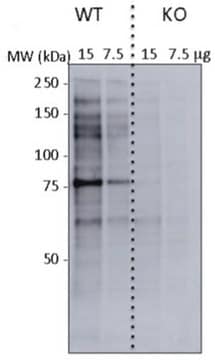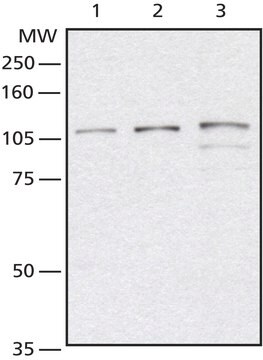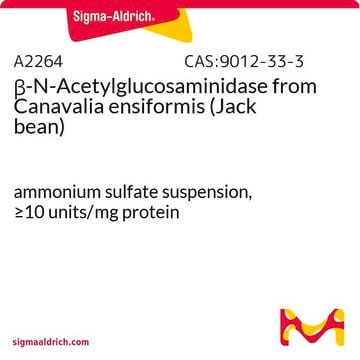O7764
Anti-β-O-Linked N-Acetylglucosamine antibody, Mouse monoclonal
clone CTD110.6, purified from hybridoma cell culture
Synonym(s):
Anti-O-GLcNAc, Anti-OGT
About This Item
Recommended Products
biological source
mouse
conjugate
unconjugated
antibody form
purified immunoglobulin
antibody product type
primary antibodies
clone
CTD110.6, monoclonal
form
buffered aqueous solution
species reactivity
wide range
concentration
~2 mg/mL
technique(s)
immunocytochemistry: suitable
immunohistochemistry: suitable
immunoprecipitation (IP): suitable
indirect ELISA: suitable
western blot: 0.2-0.4 μg/mL using total cell extract of HeLa cells
isotype
IgM
shipped in
dry ice
storage temp.
−20°C
target post-translational modification
unmodified
Gene Information
human ... OGT(8473)
General description
Specificity
Immunogen
Application
Biochem/physiol Actions
Physical form
Storage and Stability
Disclaimer
Not finding the right product?
Try our Product Selector Tool.
Storage Class Code
10 - Combustible liquids
WGK
nwg
Flash Point(F)
Not applicable
Flash Point(C)
Not applicable
Certificates of Analysis (COA)
Search for Certificates of Analysis (COA) by entering the products Lot/Batch Number. Lot and Batch Numbers can be found on a product’s label following the words ‘Lot’ or ‘Batch’.
Already Own This Product?
Find documentation for the products that you have recently purchased in the Document Library.
Customers Also Viewed
Our team of scientists has experience in all areas of research including Life Science, Material Science, Chemical Synthesis, Chromatography, Analytical and many others.
Contact Technical Service












